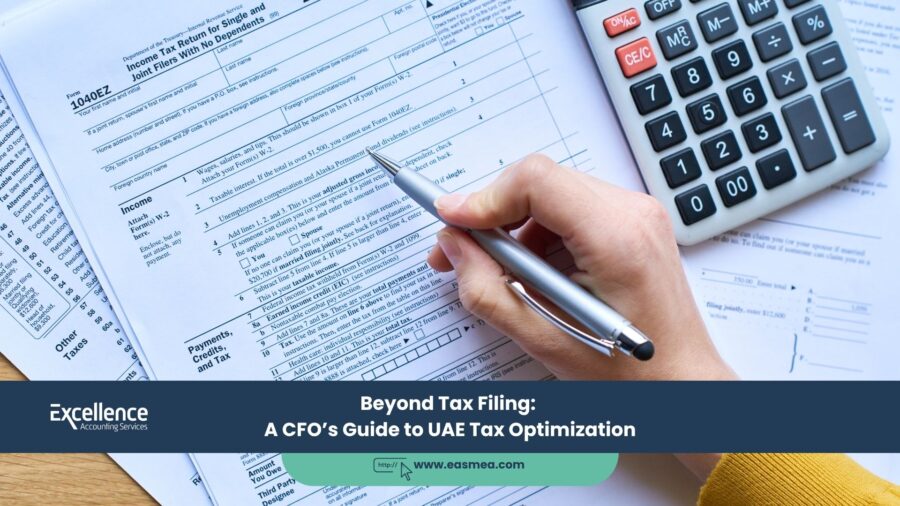Beyond Tax Filing: A CFO’s Strategic Guide to UAE Tax Optimization
With the establishment of Corporate Tax in the UAE, a new baseline for financial management has been set. For most businesses, the immediate focus has been on compliance: registering with the Federal Tax Authority (FTA), maintaining adequate records, and filing returns on time. This is the essential, non-negotiable first step. However, stopping at compliance is like buying a high-performance car and only ever driving it in first gear. You are meeting the basic requirements, but you are leaving immense potential untapped. The true power lies in shifting from a reactive compliance mindset to a proactive strategy of UAE tax optimization.
- Beyond Tax Filing: A CFO’s Strategic Guide to UAE Tax Optimization
- The Compliance Trap: Why Just Filing Isn't Enough
- The CFO's Toolkit for Strategic UAE Tax Optimization
- How Excellence Accounting Services Drives UAE Tax Optimization
- Frequently Asked Questions (FAQs)
- Are You Leaving Money on the Table for the FTA?
This is where the role of a strategic Chief Financial Officer (CFO) becomes indispensable. A CFO understands that the tax law is not merely a list of obligations, but a complex framework of rules, reliefs, and structural options. UAE tax optimization is the art and science of legally arranging your business affairs to minimize your tax liability while remaining in full compliance with the law. It’s about transforming the tax function from a simple cost center into a powerful tool for value creation. This guide provides the CFO’s playbook for moving beyond basic filing and embracing a strategy that enhances profitability and drives sustainable business value.
Key Takeaways
- Optimization vs. Evasion: UAE tax optimization is the legal and strategic structuring of business affairs to minimize tax liability, which is fundamentally different from illegal tax evasion.
- A CFO Integrates Tax into Every Decision: A strategic CFO ensures that the tax implications of every major business decision—from corporate structure to contract negotiation—are considered upfront, not as an afterthought.
- Key Optimization Levers: Effective strategies include maximizing deductible expenses, leveraging group relief provisions, making intelligent use of Free Zone benefits, and implementing a defensible transfer pricing policy.
- Documentation is Paramount: Any tax optimization strategy is only as strong as the documentation that supports it. A CFO ensures meticulous record-keeping to defend every position taken.
- Proactive Planning Yields a Competitive Advantage: By legally reducing your tax burden, you free up capital that can be reinvested into growth, innovation, and talent, giving you a significant edge over competitors with a compliance-only mindset.
The Compliance Trap: Why Just Filing Isn’t Enough
A business that focuses only on tax filing is perpetually looking backward. Its finance team gathers historical data, calculates the tax due based on past events, and submits the return. This approach completely misses the opportunity to influence the outcome. By the time the data is being compiled, the decisions that determined the tax liability have already been made.
Consider these scenarios:
- A company signs a major contract without considering the timing of revenue recognition, leading to a massive tax bill in one year that could have been spread out.
- A group of related companies operates as separate entities, with one paying high taxes on its profits while another sits on unused tax losses, unable to share the benefit.
- A business incurs significant, legitimate entertainment expenses but fails to document them properly, losing out on a 50% deduction.
In each case, the business was compliant, but it was not optimized. A strategy of UAE tax optimization, led by a CFO or an expert outsourced CFO service, ensures these costly oversights do not happen.
The CFO’s Toolkit for Strategic UAE Tax Optimization
A CFO architects a tax-efficient structure by integrating tax considerations into the core of the business strategy. They use a specific set of tools and deep knowledge of the UAE Corporate Tax law to achieve this.
1. Mastering Deductions: From Obvious to Optimized
The foundation of UAE tax optimization is ensuring every permissible dirham of expenditure is deducted from your taxable income. A CFO’s approach goes deeper than just listing standard costs.
- Expense Policy and Documentation: They establish crystal-clear internal policies for expenses, particularly in nuanced areas like employee benefits and client entertainment. They ensure the bookkeeping team is trained to capture the necessary documentation to make these deductions audit-proof.
- Capital Structure Analysis: With rules limiting interest deductibility, a CFO will analyze the company’s debt-to-equity ratio. They might advise on refinancing debt or using equity to fund a project to ensure the business stays within the optimal deduction thresholds.
- Timing of Expenditures: Where possible, a CFO will advise on the timing of large discretionary expenses (like a major marketing campaign or R&D project) to align them with high-revenue periods, effectively managing the taxable profit for the year.
2. Architectural Advantage: Corporate and Group Structuring
How your business is structured has profound tax implications. A CFO is the architect who designs the most efficient structure.
- Tax Grouping: This is one of the most powerful tools for UAE tax optimization. A CFO will analyze the ownership structure of a corporate group to see if forming a Tax Group is possible. This allows the profits of one entity to be offset by the losses of another, calculating tax on a single consolidated net income. Our business consultancy services often advise on such structuring.
- Free Zone vs. Mainland Strategy: A CFO will provide a strategic analysis of whether certain business functions are best placed in a Free Zone entity to take advantage of the 0% rate on “Qualifying Income,” while ensuring all substance and compliance requirements are meticulously met.
- Restructuring and Transfers: When reorganizing the business, a CFO utilizes the intra-group relief provisions to ensure assets can be moved between qualifying group companies without triggering an immediate tax liability.
3. Defensible Transfer Pricing (TP)
For any business with transactions between related parties, transfer pricing is a major area of focus for the FTA. A reactive approach is risky. A proactive CFO ensures:
- A Documented TP Policy: They don’t wait for an audit. A clear policy is created that outlines the methodology used to determine arm’s length pricing for inter-company transactions.
- Benchmarking Studies: Where necessary, they will commission studies to benchmark the company’s pricing against industry standards, providing a powerful defense during a tax audit.
Strategic tax planning is not about finding loopholes. It’s about understanding the legal pathways the government has created and navigating them intelligently.
How Excellence Accounting Services Drives UAE Tax Optimization
At Excellence Accounting Services, we believe tax should be a strategic function, not just a compliance exercise. Our CFO-led approach is designed to deliver maximum value and peace of mind.
- CFO-Led Tax Strategy: Our Outsourced CFO Services are at the heart of our offering, providing the high-level strategic thinking to create a bespoke plan for your UAE tax optimization.
- Expert Tax Advisory: Our dedicated UAE Corporate Tax team has the deep technical knowledge to advise on complex issues like Tax Groups, Free Zone qualifications, and transfer pricing.
- Audit-Proof Documentation: We build your defense from the ground up with immaculate Accounting and Bookkeeping services, ensuring every position is supported by robust evidence.
- Intelligent Structuring: Our Business Consultancy services help you design or restructure your corporate group for maximum tax efficiency and commercial effectiveness.
Frequently Asked Questions (FAQs)
Yes, absolutely. UAE tax optimization (also known as tax planning or tax avoidance) is the legal process of arranging your affairs to pay the minimum amount of tax required by law. This is completely different from tax evasion, which is the illegal act of hiding income or falsifying expenses to evade taxes.
No. While large corporations have more complex structures, the principles of optimization apply to all businesses. SMEs can benefit significantly from strategies like proper expense documentation, choosing the right accounting methods, and making tax-aware decisions about investments and financing. The potential savings are often more impactful for an SME.
It means that any transaction between your company and a “related party” (like another company you own, or a major shareholder) must be priced as if the two parties were completely independent and negotiating in their own self-interest. The goal is to prevent companies from artificially shifting profits to lower-tax entities through unrealistic pricing.
Yes, it can impact the timing of your tax payments. The two main methods are FIFO (First-In, First-Out) and Weighted Average Cost. In a period of rising costs, using FIFO can result in a lower cost of goods sold and thus higher taxable profit. A CFO can analyze which method is most appropriate and tax-efficient for your business, in line with accounting standards.
This is a key area of UAE tax optimization. Interest paid on debt (a loan) is generally a tax-deductible expense (subject to limitations), which reduces your taxable profit. Payments to equity investors (dividends) are paid out of after-tax profits and are not deductible. A CFO will model the after-tax cost of both financing options to guide your capital structure strategy.
This is a dangerous misconception. To benefit from the 0% rate, you must be a “Qualifying Free Zone Person” and only earn “Qualifying Income.” A CFO is critical in ensuring you meet all the stringent conditions, properly segregate your income streams, and maintain the required substance to defend your 0% status during an audit.
Your tax strategy should not be static. It should be reviewed at least annually, or whenever there is a significant change in your business, such as a planned acquisition, a major expansion, a change in ownership structure, or changes in the tax law itself. A proactive CFO integrates this review into the regular strategic planning cycle.
The CFO leads the strategic defense. They act as the primary point of contact with the FTA, manage the flow of information, and work with tax advisors to formulate responses. Their prior work in UAE tax optimization means there is already a clear, documented rationale for every position taken on the tax return, making the audit process far smoother and less risky.
Generally, accounting provisions (estimates of future losses) are not deductible for UAE Corporate Tax purposes. You can typically only claim a deduction when the loss is actually realized (e.g., a specific debt is confirmed as irrecoverable). A CFO understands these specific rules and ensures the tax computation is adjusted correctly from the accounting profit.
The biggest mistake is viewing tax purely as a compliance task to be handled by a junior accountant once a year. This reactive mindset guarantees you will pay more tax than legally required over the long term. The most successful businesses treat tax as a strategic issue that requires high-level oversight from a CFO.
Conclusion: A Strategic Imperative for a Competitive Edge
In the new tax era of the UAE, your financial strategy is incomplete without a robust plan for tax optimization. It is a fundamental discipline that impacts your profitability, cash flow, and overall enterprise value. By moving beyond simple compliance and embracing a proactive approach led by a strategic CFO, you transform a perceived burden into a powerful competitive advantage. Effective UAE tax optimization is not just about saving money; it’s about building a smarter, more resilient, and more valuable business.
Are You Leaving Money on the Table for the FTA?
Let Excellence Accounting Services guide you beyond compliance. Our CFO-led approach to UAE tax optimization is designed to protect your assets and enhance your bottom line.




